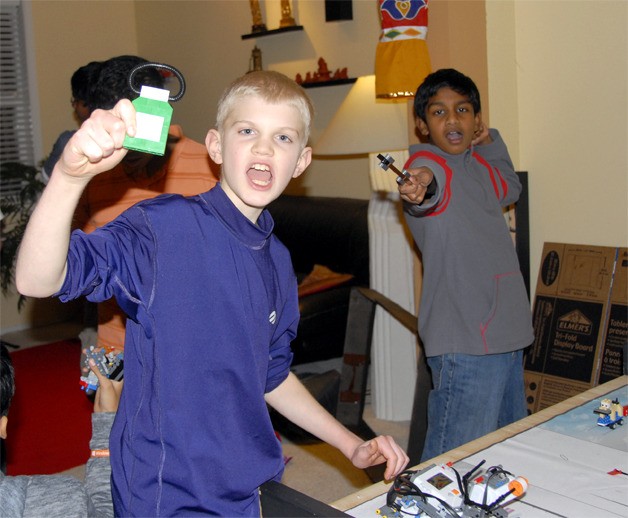Crossing generational divides, no problem. Sparking 10 to 12 year-olds’ interest in how arthritis and Alzheimer’s Disease affect the body, simple. Getting a diverse group of students to work together—and work hard—outside of school hours so they can compete for little more than bragging rights, just as easy.
None of these things were too difficult for the four Upper Valley elementary- and middle-school teams to enter the Washington FIRST (FIRSTWA) “Senior Solutions” competition in Bellevue Dec. 8 and 9. What they did have problems with were weak robotic arms, sensors that needed frequent recalibration, and dozens of other programming tricks to make their robots behave as needed, not to mention the expense of hologram technology.
“In a couple of years, we’ll probably add the hologram, but for now it will be without,” says Vishnu Rathnam, with absolutely no sarcasm.
“It will probably be a couple of years at least… the current hologram technology is very limited,” adds his “I Forgot” teammate Quinn Gieseke.
They’re talking about their robotics team’s invention, the Holokayne, which is a wave-of-the-future walking cane, with a glass ball on top to display and receive images, along with phone calls, for the user. It’s totally voice-activated (“since most older people aren’t very savvy with technology,” Gieseke said) and uses facial recognition software to identify people if the user, like the team’s target demographic, suffers from Alzheimer’s Disease.
Of course, the cuarrent prototype of the device doesn’t do any of those things, but the technology already exists, and the mostly Chief Kanim Middle School-based team, Rathnam and his younger brother Hari, Gieseke, Rahul Chali, Beau Johnson and Rahul Rajkumar, is updating the design for the next level of competition. Team “I Forgot,” coached by Ram Rathnam, was the top-ranked team of 55 in the Bellevue competition, and if they win at regionals in February, the boys will advance, with the eastern Washington regional champion, to national competition.
Other teams from the Snoqualmie Valley School District earned honors at the Bellevue competition, like the Gracious Professionalism Award that went to SnoBotics—Snoqualmie Middle School eighth graders Grant Baker, Connor Ross, Ben McLean, Alex White, Max Cannella and Jasper Chee, coached by Nancy Baker, and the judge’s trophy that went to one of the few all-girls teams in competition, the Twin Falls Middle School Radioactive Ravenbots.
“Five of the girls were rookies and they did extremely well,” said their coach Paul Sprouse, who also coached the Twin Falls boys team of Adam Hacherl, Sawyer Romano, Gabriel Sua-Healy, Ryo Karr, Nicholas Puntillo and Murphy McDowell, and the Opstad Elementary School team of Madison Dyhre-Hansen, Adriana Spaziano, Calvin Sprouse, Gabi Bleha, Ethan Peterson, Jaden Kokenge, James Nye, Sydney Sprouse and Alexander Bourlin.
Teams competed and were judged on three main criteria, the WAFIRST core values of working together as a team, a research project and creative solution, like the Holokayne, to a common problem for senior citizens, and negotiating a robot through an obstacle course of daily life challenges for a mobility- or memory-impaired person, like balancing on a bumpy surface, selecting the correct prescription bottle from a line-up, reaching for items on high shelves, and fine motor skills like piecing together a quilt.
Many teams visited with senior citizens and aging experts to learn about their daily challenges firsthand.
“We talked to them about what’s difficult, and what they would like help with,” said Vishnu. “And we read them stories and talked to them, and they really liked that,” added Hari.
The teams:
Radioactive Ravenbots: Mary-Jo Mobley, Eden Mark, Twilight Schertz, Lucy Skylstad, Natalie Cowan and Delaney Edwards. Coach: Paul SprouseWant to play cards, but frustrated by how hard it is to shuffle? You need the Shufflemaster 3000! The singsong sales pitch of the team’s presentation hypes their invention, an automated card shuffler and dealer that mostly works, because the seniors they talked to said the cards were hard to handle.
Snobotics: Grant Baker, Connor Ross, Ben McLean, Alex White, Max Cannella and Jasper Chee. Coach: Nancy BakerThe Snobotics senior solution is a prototype walker, with built-in GPS and an emergency button that triggers a voice-activated phone. Their project reports “If a senior has mobility and memory issues, they could still be semi-independent with this solution but have a failsafe in their explorations outside of home.”
RavenBots: Adam Hacherl, Sawyer Romano, Gabriel Sua-Healy, Ryo Karr, Nicholas Puntillo and Murphy McDowell. Coach: Paul SprouseArthritis can really make once-simple jobs difficult, so the RavenBots decided their product would do at least one daily chore for their seniors. They built a wheeled robot and custom mailbox; the robot navigates to the mailbox on its own power, lowers and raises the mail-catching arm as needed, and opens the special mailbox to retrieve the deliveries.
Opstad WhatChaMaCallIts: Madison Dyhre-Hansen, Adriana Spaziano, Calvin Sprouse, Gabi Bleha, Ethan Peterson, Jaden Kokenge, James Nye, Sydney Sprouse and Alexander Bourlin. Coach: Paul SprouseThis team of third, fourth and fifth graders from Opstad Elementary School focused on a solution to give seniors back some of their lost independence. They created a manufacturing company that developed robots to do small jobs, such as the Sockinator to help put on socks, the Reachinator to grab distant objects, and the self-explanatory Helpwhenyoufallinator.
I Forgot: Rahul Chaliparambil, Quinn Gieseke, Beau Johnson, Rahul Rajkumar, Hari Rathnam and Vishnu Rathnam. Coach: Ram RathnuAlzheimer’s is a prevalent disease in people older than 65, and two members of Team I Forgot have had family members affected by it, so it was an easy choice for the group to focus their solutions on this condition. They did extensive research on the disease, and are now fine-tuning their robot, as well as their Holokayne solution, for the state-level competition, but still no holograms.



